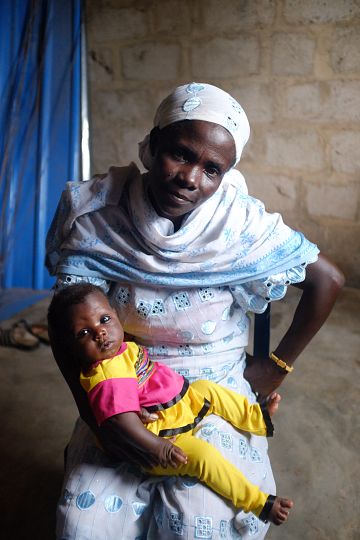Malaria Consortium begins distribution of over seven million LLINs in Nigeria
8 December 2021
Malaria Consortium has today begun the mass distribution of over seven million long-lasting insecticide treated nets (LLINs) to help reduce the burden of malaria in Nigeria. Two LLIN campaigns will distribute 3.3 million LLINs to residents in Ondo state, southwest Nigeria starting this week, with a further 3.9 million LLINs currently planned for distribution in Anambra state in southeast Nigeria, in February 2022.
The campaigns will also undertake household registration, training of local distributors and data collection. In light of COVID-19, LLIN distributors are also being provided with personal protective equipment including face masks, gloves and hand sanitiser, to reduce exposure to COVID-19.
Funding for the campaign was granted to Malaria Consortium through Open Philanthropy, in line with GiveWell’s recommendation and based on our extensive experience supporting large-scale health campaigns in Nigeria, as well as designing and managing LLIN campaign evaluation studies.
To better understand the cost-effectiveness of LLIN mass distribution campaigns, Malaria Consortium will also undertake extensive monitoring and evaluation research in Ondo state. “We are delighted we have received further funding for an additional study to track in more detail the performance of the nets over their intended effective lifetime” said Charles Nelson, Malaria Consortium’s Chief Executive.
Malaria is one of the leading causes of death in Nigeria, with the country accounting for 27 percent of malaria cases globally and 23 percent of deaths from the disease. The systematic distribution of LLINs, along with information on how to hang, use and maintain them properly, has been at the heart of WHO guidance on malaria prevention over the past two decades. The population in Ondo and Anambra states are at an increased risk of malaria, having not received nets in a mass campaign since 2017 and 2014 respectively; a typical lifespan of a LLIN is between two and three years. Funding for campaigns in these states was not able to be secured by other means, making this campaign even more important.
“Despite huge progress in malaria control in Nigeria in the last 10 years, progress has slowed and there are gaps in the committed funds for implementing the recently approved National Malaria Strategic Plan (2021-25), particularly the gap in funding LLIN campaigns in Anambra and Ondo states. We are pleased to be able to make such a big contribution to increasing the overall number of households protected from malaria in the country and supporting the government in fast tracking the implementation of its roadmap for achieving Universal Health Coverage,” said Dr Kolawole Maxwell, Malaria Consortium’s West and Central Africa Programmes Director.
Related content
27 April 2017
World Malaria Day 2017: Mozambique�s Niassa province launches mass net distribution
19 March 2008Support to National Malaria Programme (SuNMaP)
5 July 2017Delivering nets at the last mile: success through promoting a culture of net use
Latest news
- International summit calls for AMR accountability in public health interventions21st March 2024
- Global SMC community celebrates new milestone at SMC Alliance Annual Meeting in Nigeria6th March 2024
- Scaling up key interventions could halve pneumonia-related childhood mortality13th February 2024
- Malaria Consortium and eGov Foundation join Mozambique’s national malaria programme to digitalise seasonal malaria chemoprevention campaigns8th February 2024
- World’s first malaria vaccine rollout launched in Cameroon22nd January 2024
- Digital solutions driving equitable access to health6th December 2023